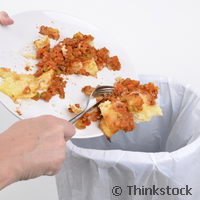Nurturing social innovation to reduce food waste
Innovation for more sustainable food systems is not just about improving food technology and communication activities. Social innovation also has a powerful role to play, according to Sophie Easteal of the FP7-funded FUSIONS (Food Use for Social Innovation by Optimising Waste Prevention Strategies) project who spoke at Green Week in Brussels earlier this month. Speaking on behalf of WRAP in the UK, one of FUSIONS' 21 project partners, Sophie presented how the project is working towards achieving a more resource efficient Europe by significantly reducing food waste. Food waste generates severe environmental, economic and social impacts. Food production and consumption in the EU generate an estimated 20 % to 30 % of all EU environmental impacts. It is estimated that the portion of food waste which can be avoided represents an average economic cost of EUR 595 per household per year. It also reflects a huge global imbalance - while an estimated third to a half 4 of all of current food production ends up as waste, approximately 868 million individuals, or 12 % of the world population, are undernourished. In an attempt to address this problem, one of FUSIONS' focuses is on testing the role of social innovation in reducing food waste. But what exactly is social innovation? Sophie noted, 'The way we describe [social innovation] is simply new ideas that meet social needs and create new social relationships ... We have already got technological and communication activities but what social innovation can do is drive behaviour change in a way that is quite compelling.' Social innovation may be a new combination of existing activities, crossing sectoral or disciplinary boundaries in a way that creates new relationships. According to Sophie, it is this essence of relationship-building which is both very powerful and unique to social innovation. This can mean, for example, an initiative for redistributing food based on building an alliance between food businesses with a surplus and charities with a need. FUSIONS has created an inventory of existing social innovation initiatives that are reducing food waste around the EU. The aim is to spread existing good practice but also hopefully catalyse some new ideas and take-up in other sectors or other countries. Sophie commented on the inventory, 'What really stands out is the variety of initiatives already being progressed at all sorts of levels. I think it really demonstrates how much individual effort is already going into reducing food waste and how much we can learn from each other. The inventory will be updated throughout the project so more examples are welcome!' The project is also carrying out feasibility studies. It has awarded funding to eight different projects in different countries across Europe to test social innovation with regards to food waste. For example, in Greece, FUSIONS is working with a schools project that is creating innovative educational tools to help parents, children, educators and cooks waste less. Another project involves the implementation of new social supermarkets based on the experience of established markets in France and Austria. The projects will be evaluated both quantitatively (how much waste they actually reduce, how many people have been involved) and they will be monitored the project evolves and takes on new ideas and new challenges. Led by Stichting Dienst Landbouwkundig Onderzoek (DLO) in the Netherlands, other work packages within FUSIONS are engaging with the problem of food waste in different ways - for example, another focus is on analysing existing methods for gathering data in order to make a proposal for an approach to the European Commission. Sophie added, 'Getting good data is essential to know what you're dealing with, where the hotspots are and compare between countries / sectors to learn good practice.' Sophie's organisation, WRAP, has already had huge success with initiatives in the UK where the amount of food waste has been reduced by 20 % since 2007. It is hoped that FUSIONS will also prove successful in contributing towards the EU target of reducing food waste by 50 % by 2030.For more information, please visit: Green Week http://www.greenweek2014.eu/index.html FUSIONS http://www.eu-fusions.org/ Project factsheet:



